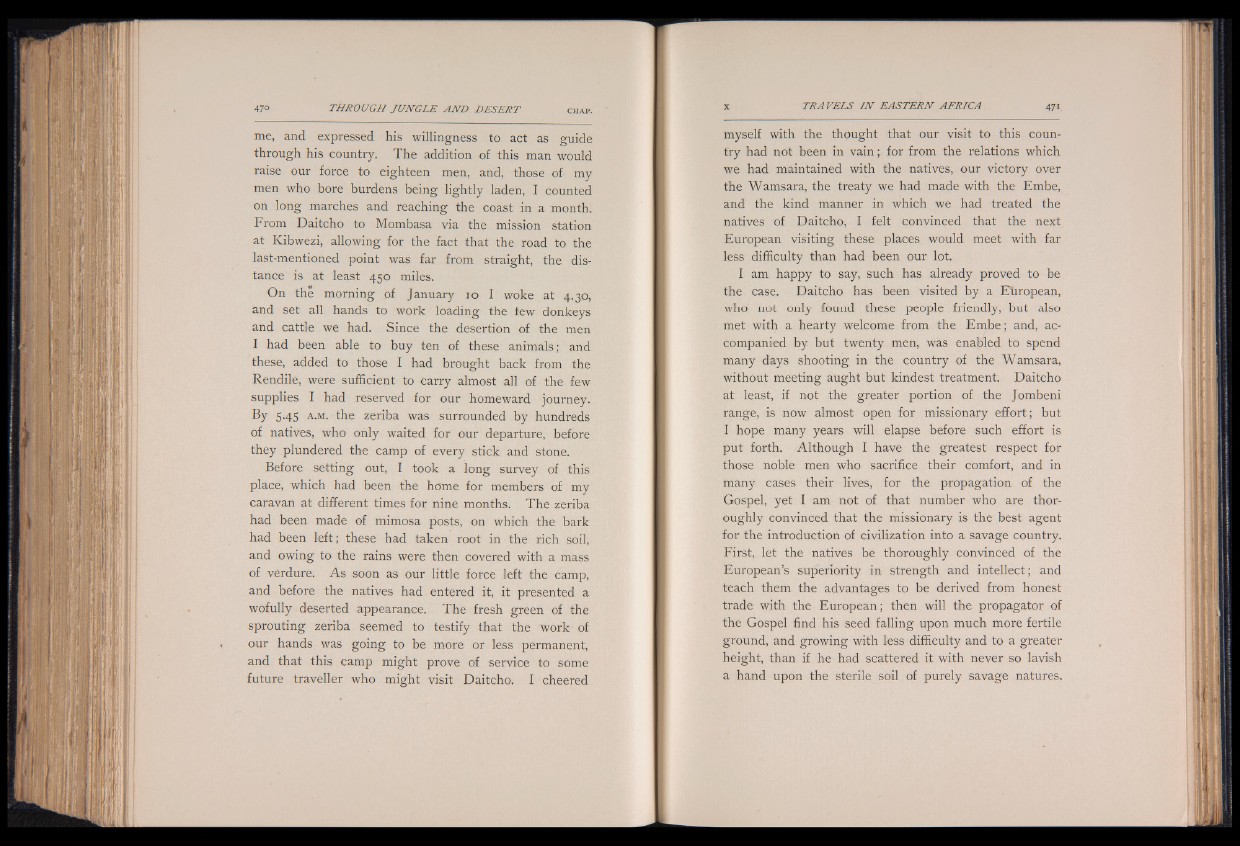
me, and expressed his willingness to act as guide
through his country. The addition of this man would
raise our force to eighteen men, and, those of' my
men who bore burdens being lightly laden, I counted
on long marches and reaching the coast in a month.
From Daitcho to Mombasa via the mission station
at Kibwezi, allowing for the fact that the road to the
last-mentioned point was far from straight, the distance
is at least 450 miles.
On the morning of January 10 I woke at 4.30,
and set all hands to work loading the few donkeys
and cattle we had. Since the desertion of the men
I had been able to buy ten of these animals; and
these, added to those I had brought back from the
Rendile, were sufficient to carry almost all of the few
supplies I had reserved for our homeward journey.
By 5.45 a .m . the zeriba was surrounded by hundreds
of natives, who only waited for our departure, before
they plundered the camp of every stick and stone.
Before setting out, I took a long survey of this
place, which had been the home for members of my
caravan at different times for nine months. The zeriba
had been made of mimosa posts, on which the bark
had been left; these had taken root in the rich soil,
and owing to the rains were then covered with a mass
of verdure. As soon as our little force left the camp,
and before the natives had entered it, it presented a
wofully deserted appearance. The fresh green of the
sprouting zeriba seemed to testify that the work of
our hands was going to be more or less permanent,
and that this camp might prove of service to some
future traveller who might visit Daitcho. I cheered
myself with the thought that our visit to this country
had not been in vain; for from the relations which
we had maintained with the natives, our victory over
the Wamsara, the treaty we had made with the Embe,
and the kind manner in which we had treated the
natives of Daitcho, I felt convinced that the next
European visiting these places would meet with far
less difficulty than had been our lot.
I am happy to say, such has already proved to be
the case. Daitcho has been visited by a European,
who not only found these people friendly, but also
met with a hearty welcome from the Embe; and, accompanied
by but twenty men, was enabled to spend
many days shooting in the country of the Wamsara,
without meeting aught but kindest treatment. Daitcho
at least, if not the greater portion of the Jombeni
range, is now almost open for missionary effort; but
I hope many years will elapse before such effort is
put forth. Although I have the greatest respect for
those noble men who sacrifice their comfort, and in
many cases their lives, for the propagation of the
Gospel, yet I am not of that number who are thoroughly
convinced that the missionary is the best agent
for the introduction of civilization into a savage country.
First, let the natives be thoroughly convinced of the
European’s superiority in strength and intellect; and
teach them the advantages to be derived from honest
trade with the European; then will the propagator of
the Gospel find his seed falling upon much more fertile
ground, and growing with less difficulty and to a greater
height, than if he had scattered it with never so lavish
a hand upon the sterile soil of purely savage natures.